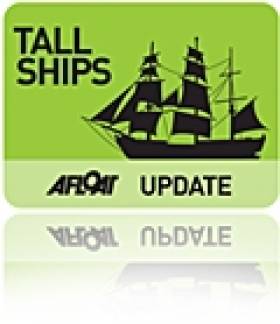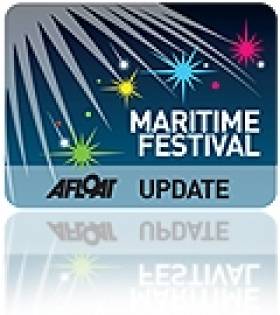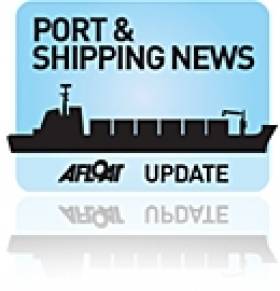Displaying items by tag: New Ross
The Return of the 'Wexford' Tall-Ship
A grant of €1m from Fáilte Ireland was allocated towards the cost of the refit as part of the National Development Plan (NDP). Visitors can now take guided tours of the floating tourist attraction though access to the shoreside visitor centre remains closed due to an upgrade. Work on an extension of a new exhibition centre is expected to be completed in May or June.
Dunbrody is a full scale reconstruction of the 19th century replica famine-ship based on the vessel built in 1845 in Quebec, Canada for the Graves family of New Ross. Ireland's most inland port being made famous with the visit of President John F. Kennedy in 1963 to the same quayside where Dunbrody is berthed.
To date the Dunbrody's presence outside her homeport has been scarce. During the Waterford Tall Ships Festival in 2005 she took part in a memorable and historic 'Parade of Sail' where she formed as part of the trio of Irish tall ships that met together for the only time. The sailing spectacle of the international fleet was headed firstly by the Irish trio with Asgard II leading followed by Dunbrody and astern the Jeanie Johnston.
In the following year Dunbrody made her maiden and only international voyage to Milford Haven in south Wales. The Pembrokeshire estuary had hosted the new festival, Seafair Haven. On that occasion she had the honour of leading another parade of sail, under the command of Captain Tom McCarthy.
Dunbrody was last dry-docked in 2006 and also at the New Ross boatyard which lies on the Co. Kilkenny side of the riverbank. The 176 foot / 54 metre barque was built in 2001 and was last vessel completed at the boatyard. During her building the public could access the yard and the construction process could be viewed from above at a gallery set within the covered building hall.
The structure no longer exists but which was built originally for the Ross Company boatyard during the 1970's. The yard specialised in building barge pontoons for markets in the North Sea until the premises closed in the 1980's. In recent years and under new management the dry-dock (75m X 15m) has been upgraded with a new gate and pump.
Looking for further reading on Tall Ships in Ireland? Click the links below:
Click this link to read all our Tall Ships Stories on one handy page
Previewing Ireland's Tall Ships 2011 Season
Can Ireland Get a New Tall Ship?
- Asgard II
- Jeanie Johnston
- river barrow
- New Ross
- River Suir
- Milford Haven
- Ports and Shipping News
- barque
- Fáilte Ireland
- Dunbrody
- Parade of Sail
- Brigantine
- Waterford Tall Ships Festival
- Dunbrody Heritage Centre
- River Nore
- New Ross Boat Yard
- Sea Haven
- National Development Plan
- NDP
- President John F. Kennedy
- Capt. Tom McCarthy
- Ross Company
- Seafair Haven
Ireland Newfoundland Conference to Focus on Marine Leisure Infrastructure
Almost 50% of the Newfoundland population can trace their ancestry to South East Ireland. The two islands also share economic development challenges, providing opportunities for collaboration in the areas of fisheries, coastal tourism and local development.
In 2004, an annual festival was developed to facilitate closer cooperation between the two countries. The festival alternates between South East Ireland and Newfoundland consists of a series of 60 events over ten days including three formal conferences.
Ireland Newfoundland Festival of the Sea - Marine Leisure Conference
Friday, 24th September 2010, 9am - Brandon House Hotel, New Ross, Co. Wexford
9:00 Registration
9:30 – Introductions by Sean Reidy, CEO JFK Trust
- Welcome by John Dwyer, Chairman, New Ross Town Council
- Opening by Sean Connick, Minister of State, Department of Agriculture, Fisheries & Forestry
- Special Guest: Dennis O'Keefe, Mayor of St. John's, Newfoundland
10:00 – Developing a Marine Leisure Infrastructure Strategy with Vicki O'Donnell, Coastal & Marine Resource Centre, University College Cork
11:00 Tea & coffee
11:15 Workshops
1) Estuary and cruising ground, facilities at harbours
Chaired by – Captain Phil Murphy, Kilmore Quay Harbour Office & Andy Careen, Southern Shore, Newfoundland
2) Community heritage interpretation
Chaired by - Declan Rice, CEO, Kilkenny Leader Partnership & Pat Curran, CEO, Irish Loop Development Board, Newfoundland
3) Marketing & packaging
Chaired by – Ethna Murphy, Fáilte Ireland & John Chidley, Ferryland, Newfoundland
12:30 Feedback chaired by David Minogue, Town Clerk, New Ross Town Council
13:00 Lunch
14:30 Boat trip to Duncannon (bus collection in Duncannon and on to Hook Lighthouse)
14:30 Bus trip to Kennedy Homestead, Duncannon and on to Hook Lighthouse
Almost 50% of the Newfoundland population can trace their ancestry to South East Ireland. The two islands also share economic development challenges, providing opportunities for collaboration in the areas of fisheries, coastal tourism & local development.
In 2004, an annual festival was developed to facilitate closer cooperation between the two countries. The festival alternates between South East Ireland & Newfoundland & consists of a series of 60 events over 10 days including 3 formal conferences.
Each festival has featured a conference on the marine sector & this year, 2010, New Ross is hosting a conference with a focus on Marine Leisure Infrastructure as a useful focus for both countries, with contributions from each country.
Past events of the Ireland Newfoundland Festival
2004
Hook Head Visit from the Premier of Newfoundland & Labrador & the Minister for Innovation
Newfoundland Irish representatives met with the Premier of Newfoundland & Labrador, & representatives of the Federal & Provincial Government as well as many communities in the Southern Avalon
Duncannon Visit from the Minister for Tourism of Newfoundland & Labrador
2005
Dunmore East Full Festival including Maritime Heritage conference with an Irish contribution from the Coastal & Marine Resources Centre, UCC
2006
Newfoundland Full Festival including Coastal Zone & Catchment Management conference with Irish contributions from: Dept of Marine; Eastern Regional Fisheries Board; Coastal & Marine Resources Centre, UCC & National Fishermen's' Association
2007
Kilmore Quay Full Festival including Fisheries & Coastal Communities conference with Irish contributions from: DG Fisheries & Maritime Affairs, European Commission; Marine Institute & BIM
2009
Newfoundland Full Festival including Fisheries conference with Irish contributions from local charter angling boats.
Government Begins Review of Irish Ports
Minister for Transport Noel Dempsey T.D. today announced the launch of a national ports policy review with the publication of a consultation document.
There are ten State commercial port companies established and operating pursuant to the terms of the Harbours Acts 1996 - 2009; Cork, Drogheda, Dublin, Dundalk, Dún Laoghaire, Galway, New Ross, Shannon Foynes, Waterford and Wicklow.
It is estimated that approximately 99% by volume of all goods traded into and out of Ireland are handled at our ports. Dublin Port is the State's biggest port handling approximately 44% of all tonnage in 2009. Cork and Shannon Foynes were the second and third biggest ports respectively in 2009.
Today's consultation document provides stakeholders with an opportunity to help shape future ports policy.
Speaking today Minister Dempsey said; "In 2005 our national Ports Policy Statement outlined national ports policy in a single document for the first time. Since then the commercial, technological, and regulatory environment in which Irish ports operate has changed dramatically, both domestically and globally. It is now time to carry out a review of this policy framework to ensure that our ports are properly positioned for the future.
Since 2005 our ports have experienced both record highs and more recently sharp declines in tonnage throughput. The ports face considerable challenges and it is important that national policy helps address these. The indications are that the country's return to economic growth will be export led. In this regard, it is vital that the ports are in a position to facilitate this and to make their contribution to improving national competitiveness.
I would encourage all interested parties to engage fully in this important consultation process."
The consultation document provides an overview of developments in the sector since 2005 and poses a number of questions on the continued validity and future direction of national ports policy.
Important issues addressed in the document include planning and funding future port developments, the role ports have to play in delivering the "Smarter Travel" agenda, competition within the sector and the corporate governance regime for port companies.
The public consultation period is scheduled to continue until Friday 29th October 2010.
The full Consultation Document is available for download below
To make a submission click HERE
Read Tom MacSweeney's Island Nation blog on the importance of ports HERE






























































